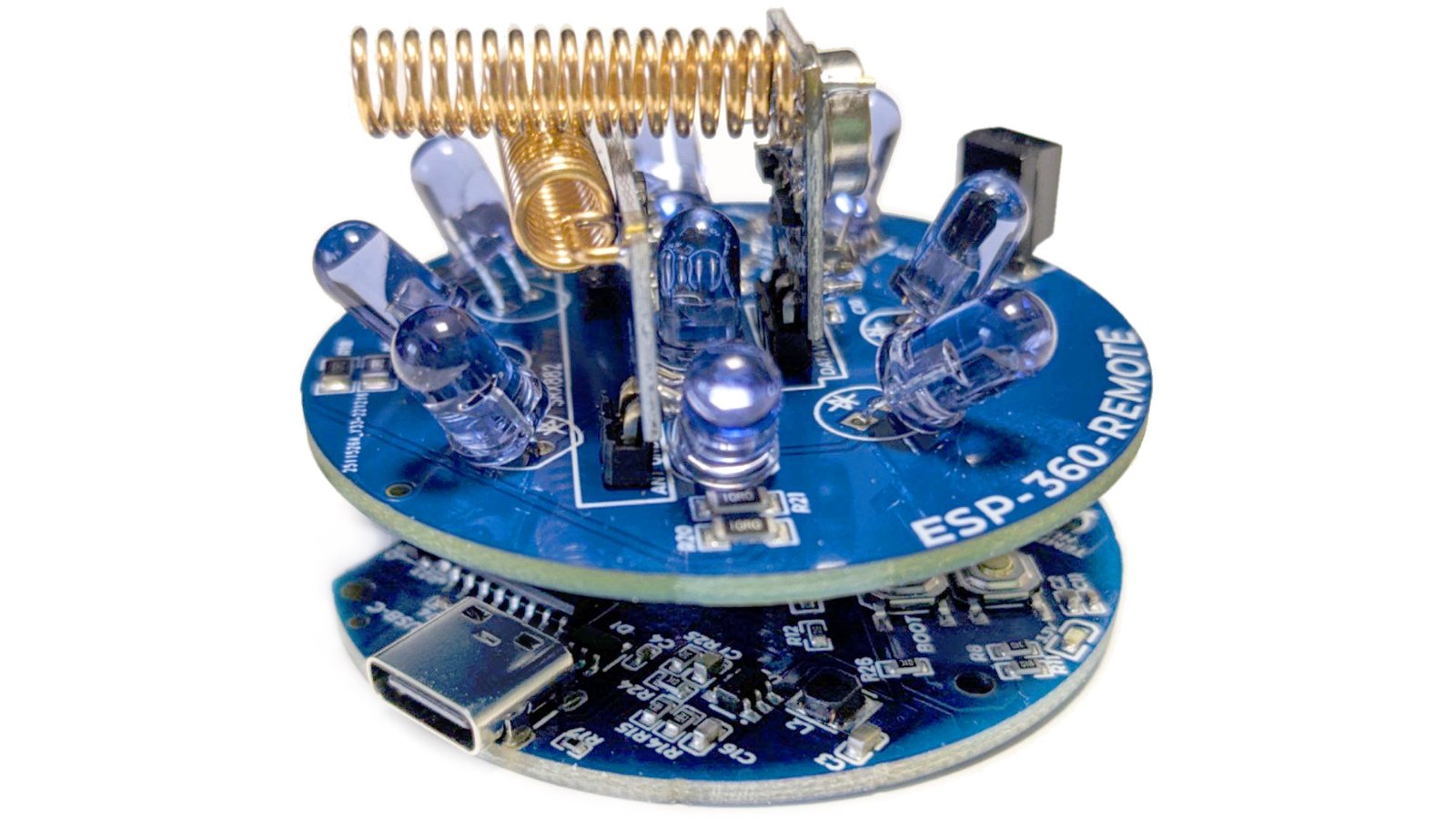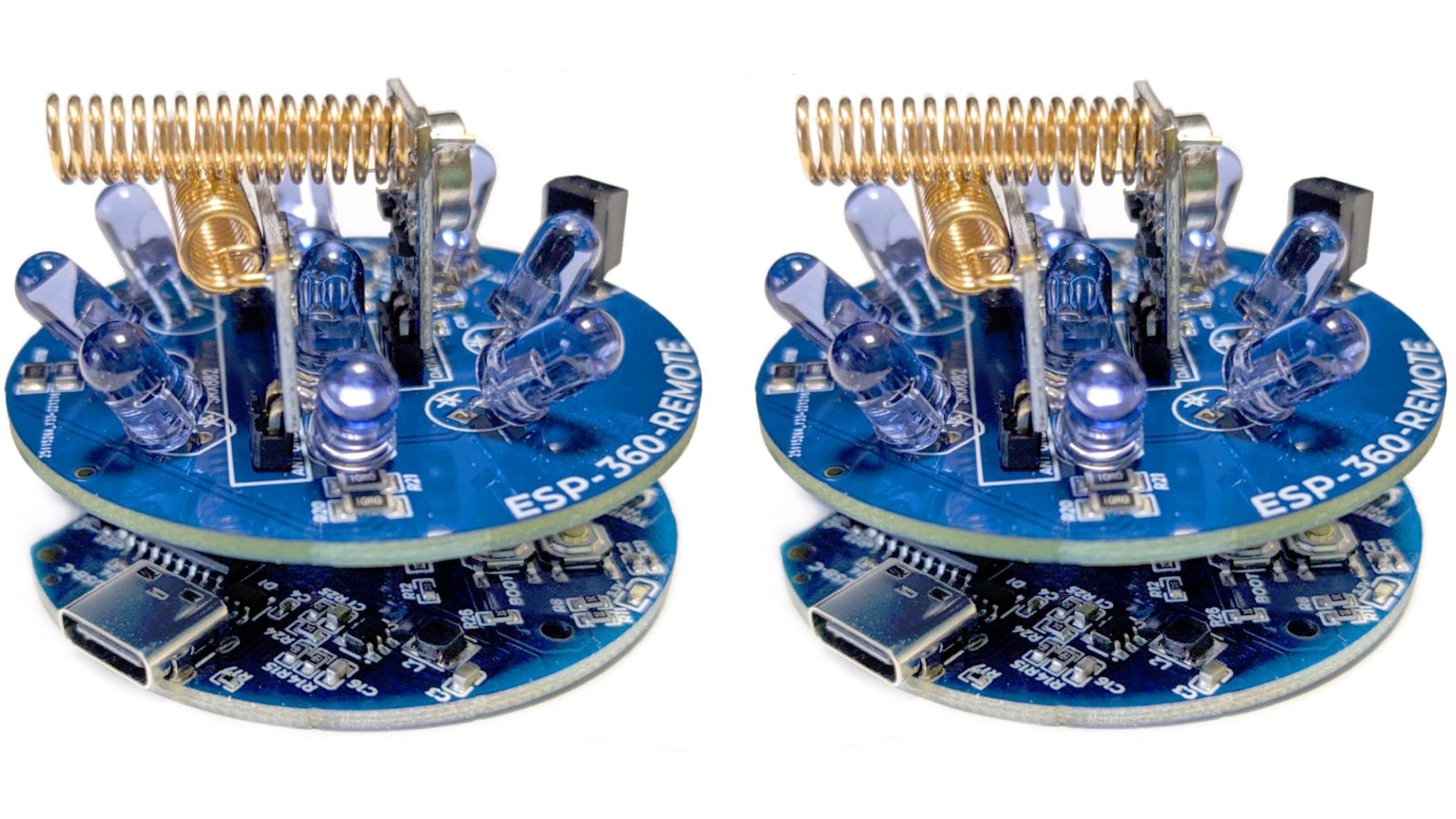ESP 360 Remote is the ideal hardware for seamlessly integrating IR and 433/315 MHz RF devices into your Home Automation system. It boasts IR and RF transmitters and receivers, as well as built-in temperature, humidity, and ambient light sensors. The board is powered by the ESP32-WROOM-32E, offering Wi-Fi and Bluetooth capabilities and countless opportunities, thanks to its extensive community support. Moreover, the board comes equipped with a USB-Type C connector, allowing for easy power and programming with your own software.
But what really sets ESP 360 Remote apart is its emphasis on privacy and local control. Unlike other devices that rely on the internet, ESP 360 Remote prioritizes keeping your data secure and in your hands.
ESP 360 Remote is composed of two stackable board layers, each with its own unique capabilities. The bottom layer includes a USB-C connector with data and power circuitry, the ESP32-WROOM-32E with boot and reset push buttons, programming pins, and sensors.
The top layer houses the RF modules, the IR receiver, and the 9 high-power IR LEDs. These are placed in a circle to optimize for 360 degree directional optimization. The 433 MHz modules will not be directly soldered onto the board, but instead will be inserted into female headers. This way, if you need to transmit at 315 MHz instead of 433 MHz, you can easily purchase SRX/STX882 RF modules in the 315 MHz version and exchange them with the ones already present.
And best of all, the two layers are stackable thanks to the 8 pin connector, which allows for endless customization possibilities by developing your own PCB layer using the exposed pins!
The board comes with pre-installed ESPHome software, but the possibilities don’t end there. You can program it with your own software and make it do anything you want! In our GitHub repo you can find the ESPHome configuration file.
Even without a smart home system, you can still take advantage of all the features packed into the ESP 360 Remote. With its built-in sensors, you can automate various tasks such as turning on the AC when the room gets too hot or switching on lights in dark rooms. If you have an RF doorbell, the ESP 360 Remote can detect the signal when someone rings and send you a notification on your smartphone. Alternatively, you can use the ESP 360 Remote as a gateway to transmit RF/IR signals from a remote.
Thanks to the integrated Bluetooth, You can use it to read other Bluetooth sensors and activate automations. Plus, it can communicate with your smartphone’s Bluetooth to detect if you’re at home. The best part is that you only need the ESP 360 Remote to make all of this happen; no additional equipment is required.
ESP 360 Remote easily integrates into smart home systems such as Home Assistant via ESPHome, which comes pre-installed and configured. Once it is connected, it can perform all of the actions mentioned so far, with the added benefit of an integrated smart home system.
Simply use geolocation to control the ESP 360 Remote, or use it as a Bluetooth repeater if you have Bluetooth sensors that are too far from your home server. To connect it with Home Assistant, simply power the device and connect it to your Wifi. Home Assistant will discover it and will show these exposed entities:
You can also take advantage of integrated services and events to receive and send IR and RF signals directly from your Home Assistant instance, and create custom switches that will automatically appear in your dashboard. You can find more details in the GitHub repository.
You can always use the ESPHome web server (also accessible from the frontend) to analyze the log, view all received signals, control entities, update the software and so on.
Thanks to the integrated support for transmitting raw signals, compatibility with the popular SmartIR custom component for Home Assistant is also ensured. If a SmartIR configuration is already present, simply specify the service for transmitting signals and specify a code compatible with ESPHome. Example of configuration.yaml below:
smartir:
climate:
- platform: smartir
name: Livingroom AC
unique_id: livingroom_ac
device_code: 7065
controller_data: esp360remote_send_ir_raw
temperature_sensor: sensor.living_room_temperature
For more information, check out the SmartIR repo.
The ESP 360 Remote is a powerful and versatile device that comes in a small and compact form factor. Its design makes it easy to create a custom 3D printed PLA enclosure that matches your home decor. Even though the enclosure is made of PLA, it won’t affect the IR and RF transmission. We’ve carefully crafted the design to be elegant and unobtrusive, allowing it to blend seamlessly into any environment. With its delicate and easy-to-use design, you’ll hardly notice it’s there.
The already-designed enclosure has some openings near the USB-C and the two built-in sensors, which helps to improve the airflow to cool down the temperature sensor. You can find the STL files in our GitHub repository.
Are you wondering how the ESP 360 Remote stacks up against the competition? Check out the comparison table below to see for yourself.
| ESP-360-REMOTE | Broadlink RM4 mini | Broadlink RM4 Pro | LOOKin Remote2 | |
|---|---|---|---|---|
| Dimensions | 55 mm x 45 mm (with case) | 47 mm x 47 mm x 42 mm | 84.4 mm x 84.4 mm x 31 mm | 80 mm x 80 mm x 36 mm |
| IR RX-TX Capabilities | Yes | Yes | Yes | Yes |
| RF RX-TX Capabilities | Yes (default 433 MHz or 315 MHz) | No | Yes (only 433 MHz) | No |
| Built-in Light Sensor | Yes (BH1750) | No | No | No |
| Built-in Temp & Humidity Sensor | Yes (SHTC3) | No | No | Yes |
| USB Type-C | Yes | No | No | No |
| Bluetooth Available | Yes | No | No | Yes |
| Arduino IDE Compatible | Yes | No | No | No |
| Internet Required | No | Yes | Yes | No |
| Open-Source | Yes (HW+SW) | No | No | No |
| Dedicated App-dependent | No (uses web page) | Yes | Yes | Yes |
| Customizable appearance | Yes | No | No | No |
We are proud to announce that this project is open-source and OSHWA certified with UID IT000012. The entire documentation, including the STL files for the enclosure, is available on our official repository on GitHub.
Our plan for manufacturing this project involves outsourcing the fabrication of the Printed Circuit Boards (PCBs) to a reliable manufacturer in China. However, the RF modules and Infrared (IR) Light-Emitting Diodes (LEDs) will be hand-soldered by our team of experts. This is because the STX882 and SRX882 are standalone modules, and the IR LEDs require manual bending instead of straight soldering.
All orders will be shipped by Crowd Supply’s fulfillment partner, Mouser Electronics. Once the manufacturing process is complete, and we have assembled, flashed, and tested all the ESP 360 Remote modules, we will make a bulk shipment to Mouser Electronics. They will then take care of the logistics and shipping to backers worldwide. You can learn more about Crowd Supply’s fulfillment service under Ordering, Paying, and Shipping in their guide.
The biggest risk that we face with this project is related to the ongoing chip shortage worldwide. To mitigate this risk, we have taken several measures, such as choosing easily replaceable components for parts like the buck converter and IR LEDs, as well as minimizing the Bill of Materials (BOM). These precautions will ensure that there are no significant delays due to part shortages.
Produced by AAElectronics in Udine, Italy.
Sold and shipped by Crowd Supply.

One ESP 360 Remote with 433 MHz RF module, configured to be ready for use with ESPHome, Home Assistant, etc.

Two ESP 360 Remotes with 433 MHz RF modules, configured to be ready for use with ESPHome, Home Assistant, etc.

· ale1800
AAElectronics's aim is to create unique and open source hardware for everyone, prioritizing usability.